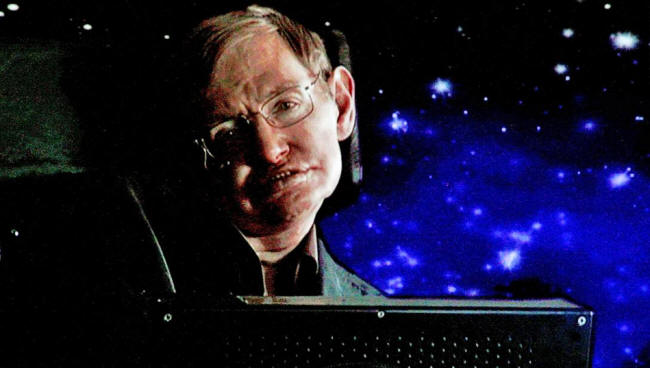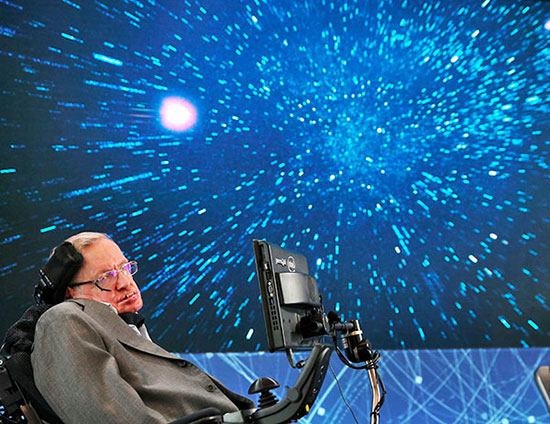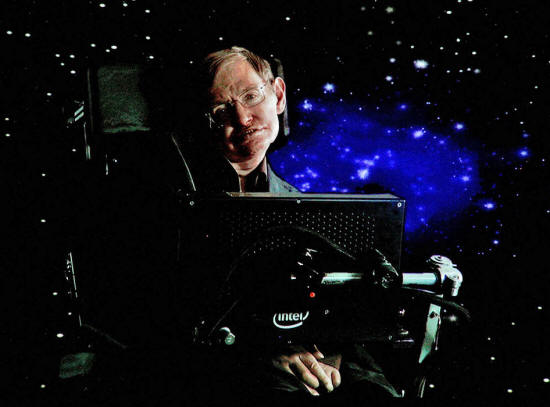|
answers questions like "Is there a God?", and "Is time travel possible?"
in his final
book...
The work was completed by
his family and publishers, who filled in the gaps by drawing on an
"enormous personal archive" of essays, interviews and articles from
Hawking's half-century career.
Hawking's answer to the God question is a resounding "no."
This sentiment, by the way, is far clearer than what Hawking famously wrote in his 1988 bestseller A Brief History of Time:
Hawking touched upon the existence of alien life.
He also argued that traveling back in time can't be ruled out, artificial intelligence might someday outsmart humans and,
Hawking's parting
gift
Still, as Matin Durrani writes for Physics World, there's a good chance the book will strike a chord with a popular audience.
At a book launch event on Monday in London, organizers played some remarks from Hawking lamenting the changing ways in which scientists are received in the culture.
"There's 'No Possibility' of God in Our
Universe"
from
LiveScience Website In a new book that was published posthumously, Stephen Hawking, who died in March, wrote that it is impossible for God
to exist in our universe.
Getty Images
He viewed creation as a scientist, and when he was called to discuss creation's biggest puzzles,
...he answered as a scientist, often to the chagrin of religious critics.
In Stephen Hawking's final book "Brief Answers to the Big Questions," published Tuesday (Oct. 16), the professor begins a series of 10 intergalactic essays by addressing life's oldest and most religiously fraught question of all:
Hawking's answer - compiled from decades of prior interviews, essays and speeches with the help of his family, colleagues and the Steven Hawking Estate - should come as no surprise to readers who have followed his work, er..., religiously.
In life, Hawking was a vocal champion of the Big Bang theory - the idea that the universe began by exploding suddenly out of an ultradense singularity smaller than an atom.
From this speck emerged all the matter, energy and empty space that the universe would ever contain, and all that raw material evolved into the cosmos we perceive today by following a strict set of scientific laws.
To Hawking and many like-minded scientists, the combined laws of gravity, relativity, quantum physics and a few other rules could explain everything that ever happened or ever will happen in our known universe.
With the universe running on a scientifically guided autopilot, the only role for an all-powerful deity might be setting the initial conditions of the universe so that those laws could take shape - a divine creator who caused the Big Bang to bang, then stepped back to behold his work.
Hawking's explanation begins with quantum mechanics, which explains how subatomic particles behave.
In quantum studies, it's common to see subatomic particles like protons and electrons seemingly appear out of 'nowhere,' stick around for a while and then disappear again to a completely different location.
Because the universe was once the size of a subatomic particle itself, it's plausible that it behaved similarly during the Big Bang, Hawking wrote.
That still doesn't explain away the possibility that God created that proton-size singularity, then flipped the quantum- mechanical switch that allowed it to pop.
But Hawking says science has an explanation here, too. To illustrate, he points to the physics of black holes:
Black holes, like the universe before the Big Bang, condense into a singularity. In this ultra-packed point of mass, gravity is so strong that it distorts time as well as light and space.
Simply put, in the depths of a black hole, time does not exist... Because the universe also began as a singularity, time itself could not have existed before the Big Bang.
Hawking's answer, then, to what happened before the Big Bang is,
This argument will do little to persuade theistic believers, but that was never Hawking's intent.
As a scientist with a near-religious devotion to understanding the Cosmos, Hawking sought to "know the mind of God" by learning everything he could about the self-sufficient universe around us.
While his view of the universe might render a divine creator and the laws of nature incompatible, it still leaves ample space for faith, hope, wonder and, especially, gratitude.
|




